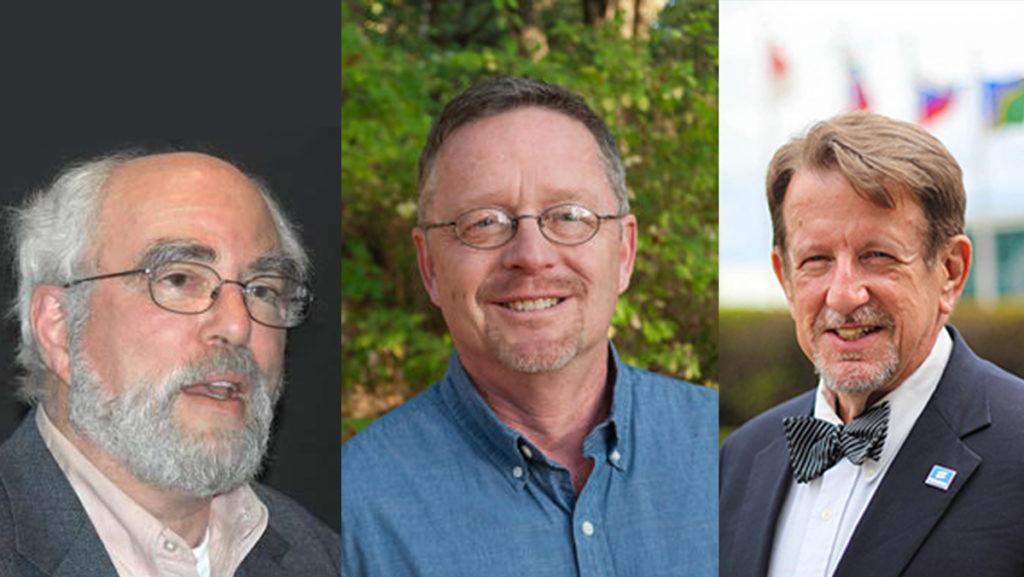Global policy experts spoke to the Ithaca College community to discuss the impact of the coronavirus pandemic on international politics.
Peace Action Ithaca College hosted the panel “World Peace in the COVID-19 Pandemic” on May 1. The panel included Chip Gagnon, professor in the Department of Politics; Bruce Knotts, director of the Unitarian Universalist Office at the United Nations (U.N.); and Joseph Gerson, director of the Peace and Economic Security Program at the American Friends Service Committee. Approximately 13 people attended the event, which was held over Zoom.
Peace Action is the largest grassroots peace organization in the country. Junior Christopher Tolve, president of Peace Action Ithaca College, brought the organization to the college in Fall 2019. Peace Action Ithaca College shares the same mission as Peace Action New York State, which promotes conflict resolution, disarmament and human rights, Tolve said. Tolve said he invited the three panelists because they all have extensive experience in their fields and knowledge of world peace.
The novel coronavirus disease, officially named COVID-19, was first reported in Wuhan, China, in December 2019. On March 11, the World Health Organization (WHO) declared COVID-19 a pandemic. As of May 14, there are 4,420,743 cases globally, 301,160 deaths and 1,578,135 recoveries, according to the Johns Hopkins Coronavirus Resource Center.
Gagnon said he thinks other countries, like China, are handling the response better than the U.S. The Chinese government implemented a lockdown of Wuhan and five other cities Jan. 23. It shut down all transportation in and out of the city and canceled all classes for schools and universities. Stores also closed, except for ones that sold medicine or groceries.
“The U.S. response, as we know, has been kind of chaotic,” Gagnon said. “The situation is definitely not under control yet. The federal government is kind of MIA. The federal government is not really doing much. They’re saying, ‘OK, it’s up to the states.’”
Gagnon also talked about how the U.S. has been pulling back from multilateral institutions, which are groups of countries that work together for a common goal. For example, the administration of President Donald Trump cut funding to the WHO, which is a multilateral institution, on April 14.
Gerson discussed how different governments have exercised their powers during this crisis.
“Donald Trump is claiming he has absolute power,” Gerson said. “Trump has been attempting to bend state governments to his will.”
While China used its authoritarian-style government to help to contain the virus, Gerson said some countries, like Hungary, are using the virus to enforce dictatorial-type power. In Hungary, Prime Minister Viktor Orbán enacted a law March 30 that will suspend elections and give him the power to rule indefinitely.
Changes, like political imbalances, that were already happening in countries — or had not started yet — are beginning because of the health crisis, Gerson said.
“Pandemics, like wars, accelerate profound structural changes that were already in motion,” Gerson said.
Knotts discussed the U.N.’s efforts in curtailing the violent actions that could come about as a result of the pandemic. U.N. Secretary-General António Guterres called for a global ceasefire and asked the U.N. Security Council to endorse the ceasefire. There are 15 members of the Security Council and only three of them — the U.S., Russia and China — are not endorsing the ceasefire.
“The conflict between China and the United States makes it impossible for the Security Council to do its job,” Knotts said.
The U.N. and the WHO have been working to recruit medical experts to work on solutions and to develop testing kits, Knotts said. Still, there has been some disconnect among agencies. Knotts said the Centers for Disease Control and Prevention made its own tests without following the protocol published by the WHO. The tests turned out to be faulty because of contamination.
Knotts said the U.S. response to the COVID-19 pandemic also led to a loss of confidence in the federal government. In an NPR poll, as of March 17, 46% of Americans say the federal government is doing enough to prevent the spread of COVID-19, and 37% of Americans say they have “a good amount or a great deal of trust in what they’re hearing from the president.”
“We are not going to come out of this with people thinking we are the exceptional nation,” Knotts said.









